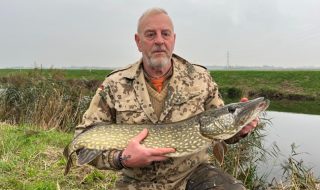Angling and Fisheries organisations call on Ministers not to throw out the environmental baby with the Brexit bathwater
The UK’s major angling and fisheries conservation groups have today published a joint paper setting out their concerns over any moves to water down EU environmental legislation and urging the government to seize opportunities for reform of policies regarding farm subsidies and fisheries management in the wake of the Brexit vote earlier this year.
The paper – Brexit, Fisheries and the Water Environment – has been jointly produced by the Angling Trust & Fish Legal, Atlantic Salmon Trust, The Rivers Trust, Countryside Alliance, Salmon & Trout Conservation UK and the Wild Trout Trust. It was formally presented to Environment Secretary Andrea Leadsom at this week’s Conservative Party Conference in Birmingham by Angling Trust & Fish Legal Chief Executive Mark Lloyd.
Three quarters of rivers in the UK are failing to reach good ecological status and much of this is down, not to industrial pollution, but to poor agricultural practices in their catchments. Many marine fish stocks are threatened as a result of commercial over-fishing.
The groups argue that whilst there is an urgent need to reform the wasteful and environmentally damaging system of agricultural subsidies, much of the improvement that has occurred in our natural environment has been underpinned by EU measures such as the Water Framework, Marine Strategy Framework, Urban Waste Water and the Habitats Directives.
The report calls for the Common Agricultural Policy (CAP) to be replaced by payments that reward environmentally sensitive practices delivered through farmer-earned recognition and voluntary accreditation. It also identified a number of opportunities arising from Brexit which could benefit both the aquatic environment and rural businesses.
Angling Trust & Fish Legal Chief Executive Mark Lloyd said:
“There is no doubt that developing a new national post-Brexit agriculture policy to replace the CAP presents a golden opportunity to develop policies that will promote both a sustainable agriculture industry and sustainable and diverse ecosystems. The future of farming depends on healthy soil and we don’t want soil choking up our rivers. Tackling soil erosion would be good for food production, reducing flood risk, protecting biodiversity and restoring fish stocks. Subsidies for production need to be converted into catchment payments for delivering ecosystem services to society. Such incentives should be contract based, and rigorously enforced to ensure that is fair to the majority who do play by the rules. Polluters should pay, and shouldn’t be paid.”
The report calls on ministers to make provision for the safeguarding of standards of environmental protection derived from European Union legislation, including for water, air, soil, flood protection, and climate change, after the withdrawal of the UK from the EU.
It argues that retention of the EU environmental directives is essential in delivering the Conservative manifesto commitment “to leave the natural environment in a better state for the next generation” through a new 25-year DEFRA plan.
Speaking at the Rural Reception at the Conservative Party Conference, the Angling Trust Campaigns Chief Martin Salter said: “We believe that these EU directives are all essential for improving the aquatic environment and protecting our fisheries and trust that Ministers will not throw out the ‘environmental baby’ with the ‘ Brexit bathwater’. In fact, we are hoping to see strengthening in some cases.”
Paul Knight, Chief Executive of Salmon & Trout Conservation UK, added: “Brexit presents us with an opportunity to give the full framework of our environmental legislation a distinctly British flavour to reflect the challenges of delivering the Conservative manifesto commitment to be the first generation to leave the environment in a better state than they found it, in an increasingly crowded island.”
Arlin Rickard, Chief Executive of The Rivers Trust, said: “We urge ministers to do all that they can to help ensure the UK safeguards existing environmental legislation and strengthens the protection of vital ecosystem services. This may be achieved through a combination of clear baseline regulation and incentives provided through new paid ecosystem services. The key being the development of innovative funding mechanisms like Cap & Trade and earned recognition opportunities, including upstream water company and local authority investment in water resource protection and Natural Flood Risk Management. It is absolutely vital that we ensure that the environment does not fall to the bottom of the pile of new policy and legislative decisions.”
The report also calls for the sustainable management of marine fisheries based on scientific evidence and the designation of recreational-only species in recognition of the far greater social and economic benefits arising from sea angling than from commercial fishing. This and other policies should be encapsulated in a new national fisheries policy covering both marine and freshwater fish, which takes much greater account of the needs and role of recreational fisheries.
The report concludes: “A healthy environment underpins economic and social well-being for a whole host of reasons. This paper focuses on the impact of Brexit on fisheries, which make a major contribution to rural and coastal economies, but we believe that there are multiple wider benefits for society and the economy from continuing to work towards complying with European environmental protection legislation.”






